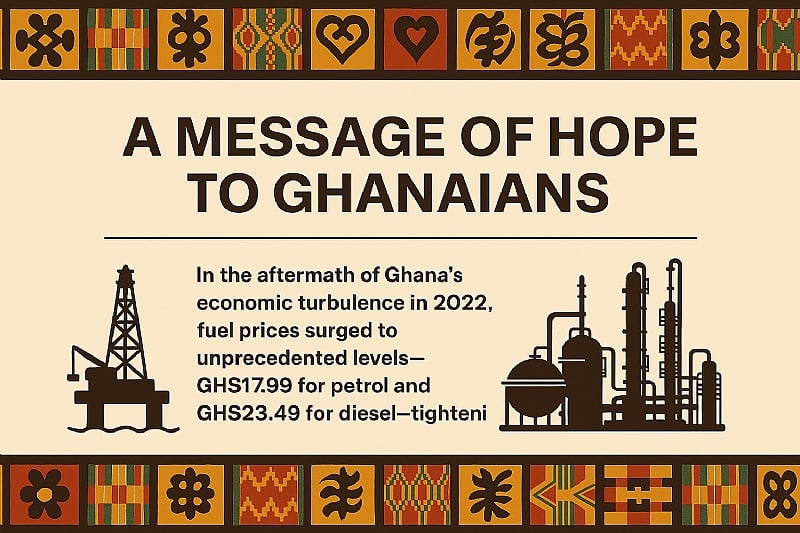🛢️In the aftermath of Ghana’s economic turbulence in 2022, fuel prices surged to unprecedented levels—GHS17.99 for petrol and GHS23.49 for diesel—tightening the grip on everyday livelihoods and reigniting debates about fiscal responsibility. The Energy Sector Levies Act (ESLA), once introduced to retire legacy debts plaguing Ghana’s power sector, became a symbol of misapplied hope.
Against this backdrop, the micro minority within the current NPP parliamentary caucus has voiced resistance to the newly proposed GHS1 petroleum levy. Yet many Ghanaians are asking a deeper question: can this group credibly critique when their own administration oversaw years of misallocated ESLA revenue, and presided over the weakening cedi?
🔍 A Glimpse into Legacy Debt and ESLA
ESLA was designed as a long-term corrective tool. Its intent: pay off crippling debts that stifled ECG, GRIDCo, and power producers. But instead of closing the fiscal wound, critics argue that the Akufo-Addo–Bawumia administration prolonged the bleeding—redirecting funds, sidelining transparency, and leaving Ghana’s energy sector gasping.
In essence, ESLA turned from reform to routine: a levy collected faithfully from citizens, yet too often lost in unclear expenditures and political priorities.
💬 Public Sentiment and Political Memory
Fuel prices in late 2022 didn’t just reflect global volatility; they exposed Ghana’s structural inefficiencies. And for many, the optics of NPP’s micro minority condemning Mahama’s revitalization vision feels disconnected from lived reality.
The argument is simple: if the ESLA model was inherited and expanded without visible gain, how can its successors be denied a new pathway to healing the sector?
💡 Mahama’s Vision and the Cedi’s Struggle
John Mahama’s proposed reforms—whether focused on energy stabilization or economic rebalancing—find resonance in a population weary of short-term fixes. At a time when the cedi danced precariously against the dollar, Ghanaians sought leadership that grounded policy in both transparency and national dignity.
As calls grow louder for restructuring, the GHS1 levy is no longer just about money—it’s about trust. A renewed compact between citizens and their state, built not on hollow levies but accountable stewardship.
🛑 Admonition to the NPP Minority
It is not enough to critique from the sidelines when legacy mistakes remain fresh in public memory. The moral weight of previous missteps demands introspection, not deflection.
Rather than veiling political criticism behind curated quotations and partisan rhetoric, the NPP micro minority must rise to the occasion and support President John Dramani Mahama’s vision for energy sector reform. This is not a time for shallow opposition—it is a time for nation-first leadership.
To govern is to build; to critique is to offer constructive alternatives. Ghana’s future must not be stalled by defensive posturing. Instead, the micro minority must champion recovery by aligning their voice with Ghana’s larger interest.
Let the words of a Ghanaian proverb guide this moment: _”When the roots of a tree begin to decay, it spreads death to the branches.”_ Our energy sector deserves healing—not politicization.
🏛️ Pathways Forward
The debate must transcend political loyalty. What matters now is a framework that:
Prioritizes transparency in energy sector levies. Monitors legacy debt payments with real-time reporting. Aligns petroleum taxes with cedi stabilization efforts. Builds broad consensus—not micro posturing—on Ghana’s energy destiny.
🛢️ Fueling Accountability: Why the GHS1 Levy Matters
In 2022, fuel prices hit GHS17.99–GHS23.49, deepening public frustration. Today, the NPP micro minority resists a GHS1 petroleum levy—yet many Ghanaians question their moral standing, given misused ESLA funds and a weakened cedi under their watch.
President Mahama’s energy reform vision offers a fresh path. This is no time for recycled criticism. As one proverb reminds us: _“When the roots of a tree decay, it spreads death to the branches.”_ Let’s demand unity, transparency, and recovery—not posturing.
Retired Senior Citizen
Teshie-Nungua
[email protected]


